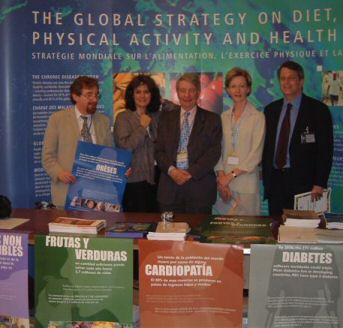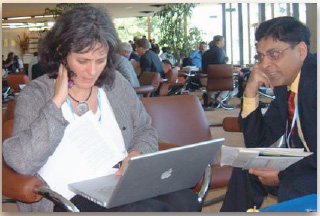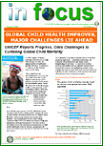|
The Global Dietary, Food Marketing, And Health Project Reports Progress
CECHE is collaborating with The Center for Science in the Public Interest (CSPI) in a multi-year Global Dietary, Food Marketing, and Health Project, designed to combat growing public health problems in developing countries and countries in economic transition that are caused, in part, by marketing practices of transnational food corporations. The project raising awareness among non-governmental organizations (NGOs) about the health effects of junk-food marketing in Asia, Africa, Latin America, and Eastern Europe; identify local NGOs interested in maintaining healthful indigenous diets; help those organizations expose and oppose marketing efforts by junk-food companies; and help them advocate for protective health and nutrition public policies on both the national and international levels. For a related project on Food Safety, visit: http://www.ceche.org/programs/food-diet/food-safety.html. CSPI with CECHE assistance has drawn together a network of organizations in developing countries and countries in economic transition and involve them in supporting international efforts (such as the World Health Organization's (WHO) Global Strategy on Diet, Physical Activity, and Health) to prevent chronic diseases through better nutrition.

Thanks, in part, to the Center for Communications, Health and the Environment’s (CECHE) support, CSPI and its international coalition – the International Association of Consumer Food Organizations (IACFO) – have strengthened their efforts to mobilize and support international consumer-advocacy organizations’ work on food-safety and nutrition issues.
CSPI and IACFO have worked diligently in cooperation with NGOs to raise awareness of the unhealthful dietary trends that are spreading from Western countries to developing countries and countries in economic transition.
Over the past year, the Global Dietary, Food Marketing, and Health Project accomplished the following:
- CSPI played a leading organizing role for the Trans-Atlantic Consumers Dialogue’s (TACD) "Generation Excess – Transatlantic Policy Approaches to Tackling Obesity” conference held in Brussels in February 2004. TACD’s “Generation Excess” conference recommended that the U.S. and the EU adopt public policy changes regarding food advertising directed at children, food labeling, school food programs, consumer education, and fast food marketing. The conference drew more than 150 participants, including many staff assistants to members of the European Parliament. It helped firm up EU support for the draft World Health Organization’s (WHO) Global Strategy on Diet, Physical Activity, and Health, which includes policy recommendations to governments on how to combat obesity.
- In May 2004, representatives from both CSPI and IACFO worked behind the scenes urging the U.S. government to support the adoption of WHO’s Global Strategy.
would not harm the economies of countries that were dependent on sugar production.
- In July 2004, representatives from IACFO spoke at the 1st Southeast Asia Conference on Corporate Social Responsibility, a conference attended by more than 50 NGOs from Asia, including groups from China, Malaysia, and Indonesia. At that conference, IACFO conducted a session on ways that NGOs can work to limit junk-food marketing within their countries.
- Representatives from CSPI and IACFO also attended the November 2004 meeting of the Codex Alimentarius Committee on Nutrition and Foods for Special Dietary Use, urging Codex to ensure that the international food standards that it develops are consistent with the goals set out in the WHO’s Global Strategy. CSPI and IACFO worked with representatives from Ghana, Zambia, and other developing countries on those issues.
- CSPI and IACFO released WHO’s unpublished report titled Food Standardisation to Support the Reduction of Chronic Diseases to the international media as it recommended that limits on junk-food advertising be incorporated into the Codex Alimentarius and called for strict limits on sugar, salt, and fat.
The project partners continue to maintain regular contac t with representatives of NGOs in developing countries and countries in economic transition. To promote improved food policies abroad, the Global Dietary, Food Marketing, and Health Project continues to strengthen consumer-based NGOs in developing countries that are concerned with nutrition, food marketing and health. During the last 12 months, the project: t with representatives of NGOs in developing countries and countries in economic transition. To promote improved food policies abroad, the Global Dietary, Food Marketing, and Health Project continues to strengthen consumer-based NGOs in developing countries that are concerned with nutrition, food marketing and health. During the last 12 months, the project:
- Expanded the membership of the IACFO to 13 members, with the network’s membership now representing all regions of the world.
- Surveyed IACFO members for new priorities and continued to participate in WHO/Food and Agricultural Organization nutrition and food safety activities.
During the same period, the IACFO:
- submitted comments on the implementation of WHO’s Global Strategy on Diet, Physical Activity and Health
- urged CODEX Alimentarius to play an active role in implementing the Global Strategy by amending current standards and devising new ones
- surveyed the marketing practices of multinational food companies
- issued press releases on global nutrition issues such as the rising incidence of obesity and diet-related disease, including Type II Diabetes.
IACFO and CSPI presented a paper in Oslo, Norway in 2006 entitled “WHO Forum on Marketing for Food and Nonalcoholic Beverages to Children,” with CSPI leading American NGO participation in the EU/US platform on Diet, Physical Activity and Health in Brussels, Belgium in 2007. CSPI and IACFO are also coordinating national anti-obesity efforts with NGOs in India, Brazil, Thailand and the United Kingdom.
|
|
 Go back to the CECHE home page
Go back to the CECHE home page



 t with representatives of NGOs in developing countries and countries in economic transition. To promote improved food policies abroad, the Global Dietary, Food Marketing, and Health Project continues to strengthen consumer-based NGOs in developing countries that are concerned with nutrition, food marketing and health. During the last 12 months, the project:
t with representatives of NGOs in developing countries and countries in economic transition. To promote improved food policies abroad, the Global Dietary, Food Marketing, and Health Project continues to strengthen consumer-based NGOs in developing countries that are concerned with nutrition, food marketing and health. During the last 12 months, the project: